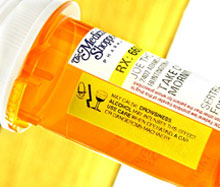Directory:NewsUSA/Articles/Mixing Alcohol and Medications Can Make a Risky Cocktail
Mixing Alcohol and Medications Can Make a Risky Cocktail
<adsense> google_ad_client = "pub-5512298628457000"; google_ad_width = 728; google_ad_height = 15; google_ad_format = "728x15_0ads_al"; google_ad_channel = ""; google_color_border = "FFFFFF"; google_color_bg = "FFFFFF"; google_color_link = "0066CC"; google_color_text = "000000"; google_color_url = "008000"; </adsense>
(NewsUSA) - Antibiotics, pain relievers and alcohol: What do these have in common? Consumed together, they can produce dangerous results.
According to a recent survey commissioned by Medicine Shoppe Pharmacies, 28 percent of respondents admit ignoring instructions not to drink alcohol while taking certain medications. Of those, 42 percent have experienced a negative physical reaction as a result.
"Consuming alcohol while taking medications can result in serious health complications," said Bill Bailey, director of Specialized Care Centers for Medicine Shoppe International Inc. "Pharmacists are medication experts and great resources for discussing how alcohol may interact with your medications."
However, the survey revealed that only 32 percent of respondents discuss potential interactions or side effects with their pharmacist or doctor each time they begin a new medication. According to the National Institute on Alcohol Abuse and Alcoholism, even small amounts of alcohol intake can influence the effectiveness of medication in several ways:
- Alcohol may diminish a drug's ability to be broken down in the bloodstream by competing for the same set of metabolizing enzymes, thus prolonging the drug's time in the body and increasing the risk of harmful reactions.
- Alcohol can magnify the effects of sedative and narcotic drugs on the brain, making daily tasks challenging and sometimes dangerous.
- Some drugs slow the body's ability to metabolize alcohol, increasing susceptibility to intoxication.
The effects can be serious. For example, the interaction of alcohol with allergy medicines and painkillers can impair central nervous system functions, which results in fatigue, confusion and poor judgment. Interactions involving antidepressants, sleep aids and blood pressure medicines can create blood pressure problems. For those on arthritis medicines, alcohol consumption can cause possible liver damage.
"The best thing to do is read the instruction label on your medication, ask questions if they seem unclear and always follow the advice of your doctor and pharmacist," said Bailey.
For more information about alcohol and drug interactions, or to find the nearest Medicine Shoppe Pharmacy in your area, visit www.medicineshoppe.com.
<adsense>
google_ad_client = "pub-5512298628457000";
google_ad_width = 728;
google_ad_height = 90;
google_ad_format = "728x90_as";
google_ad_type = "text_image";
google_ad_channel = "";
google_color_border = "FFFFFF";
google_color_bg = "FFFFFF";
google_color_link = "0066CC";
google_color_text = "000000";
google_color_url = "008000";
</adsense>
alcohol
medications
interactions
medicine
medicate
